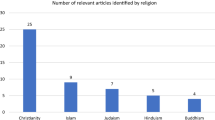Abstract
Recently, religious organisations, governments and public institutions have begun to offer apologies for historical wrongs. Can they legitimately do so? Departing from the tendency, Professor Hubert Markl, President of the Max Planck Society, has offered strong reasons for not apologising for the crimes of medical scientists who experimented on human subjects during the Nazi era. He argues that only the perpetrators can meaningfully apologise. Markl’'s position is considered and rejected in favour of the view that apologies by proxy for historical wrongs are justifiable and should be made by institutions that have the authority to do so.
Similar content being viewed by others
References
Harvey, J. (1995) The Emerging Practice of Institutional Apologies. International Journal of Applied Philosophy. 9, 2: 57–65.
Kiss, E. (1998) Saying We’re Sorry: Liberal Democracy and the Rhetoric of Collective Identity. Constellations 4: 387–398.
Joyce, R. (1999) Apologizing. Public Affairs Quarterly 13: 159–173.
Nature (2000) Hollow apologies should be avoided. 403: 813.
Safranski, Rudiger (1998) Martin Heidegger: Between Good and Evil. Harvard University Press, Cambridge, Ma.
Cf. Goldhagen, D.J. (1997) Hitler’s Willing Executioners. Abacus, London, Introduction.
MacIntyre, A. (1999) Dependent Rational Animals. Duckworth, London, chapter 12.
See, for example, Goldhagen, (1997): 12–14, 375–454.
Arendt, H. (1994) Eichmann in Jerusalem: A Report on the Banality of Evil. Revised and enlarged edition, Penguin Books, Harmondsworth: 114.
Arendt, (1994): 136.
Goldhagen (1997).
Rose, P. L. (1998) Heisenberg and the Nazi Atomic Bomb Project. University of California Press, Berkeley; Goldhagen (1997).
Williams, B. (1981) ‘Moral Luck’ in Moral Luck: Philosophical Papers 1973–80. Cambridge University Press, Cambridge: 20–39.
This argument was first sketched in Grace, D. and Carmody, J. (2000) We have moral authority to apologize for the past. Nature 405: 508.
Wolgast, E. (1992) Ethics of an Artificial Person. Stanford University Press, Stanford: 86.
See French, P. (1984) Collective and Corporate Responsibility. Columbia University Press, New York.
Thomas Hobbes (1996), Leviathan revised edition. Cambridge University Press, Cambridge: 114.
Markl, H. (1998) Retrospect and Prospect. http://www.mpg.de/reden/1998/jubilae_e.htm: 1–2.
Annas, G.J. and Grodin, M.A. (1992) The Nazi Doctors and the Nuremberg Code: Human Rights in Human Experimentation. Oxford University Press, New York: 36–7.
Annas and Gordin (1992): 46, 51–2.
Annas and Grodin (1992): 36.
Annas and Grodin (1992): 34. 34.
Annas and Grodin (1992): 35.
See International Theological Commission (1999) Memory and Reconciliation: The Church and the Faults of the Past. http://www.vatican.va/roman_curia...0000307_memory-reconcitc_en.html
Cohen, S and Grace, D. (1994) Engineers and Social Responsibility: An Obligation to Do Good. IEEE Technology and Society Magazine 13, 3: 12–19.
Cf. Harvey (1995): 62.
Aristotle (2000) Nicomachean Ethics. Edited and translated by R. Crisp. Cambridge University Press, Cambridge: 144.
See, for example, Powers, Thomas (1994) Heisenberg’s War: The Secret History of the German Bomb. Penguin Books, London; and for a critique of such apologias, Rose (1998).
Author information
Authors and Affiliations
Corresponding author
Rights and permissions
About this article
Cite this article
Grace, D. Apologising for the past: German science and nazi medicine. SCI ENG ETHICS 8, 31–42 (2002). https://doi.org/10.1007/s11948-002-0031-4
Received:
Accepted:
Issue Date:
DOI: https://doi.org/10.1007/s11948-002-0031-4




